Movie Review – Ralph Breaks The Internet
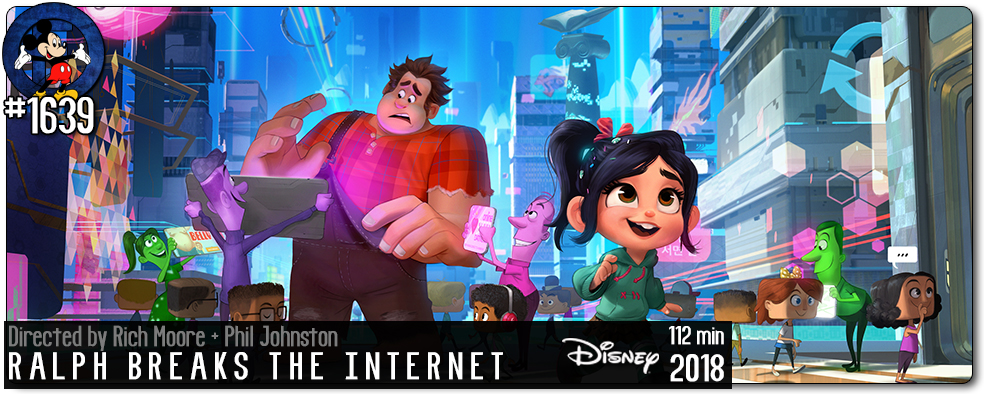
Principal Cast : John C Reilly, Sarah Silverman, Gal Gadot, Taraji P Henson, Jack McBrayer, Jane Lynch, Alan Tudyk, Alfred Molina, Ed O’Neill, Bill Hader, John DiMaggio.
Synopsis: Six years after the events of Wreck-It Ralph, Ralph and Vanellope, now friends, discover a wi-fi router in their arcade, leading them into a new adventure.
********
Today I want to talk to you about timelessness. Oh, Ralph Breaks The Internet is stunningly great, a perfect blend of whizz-bang animation, heart-and-soul storytelling and wonderful humour, but that’s not important right now. No, I want to touch on something I thought about whilst watching Disney’s latest sequel and that’s its potential relevance contrasted to its longevity. You see, both Ralph Breaks The Internet and its ancestor, 2012’s insta-classic Wreck It Ralph tap into something the core target audience may not fully appreciate, significantly the former but perhaps less so the sequel. Both films trade heavily on nostalgia and gamer-aware references, something most kids probably won’t “get” until they’re older and even then will most likely wonder what on Earth it’s all about; this makes me ask the question: will both Ralph films age poorly?
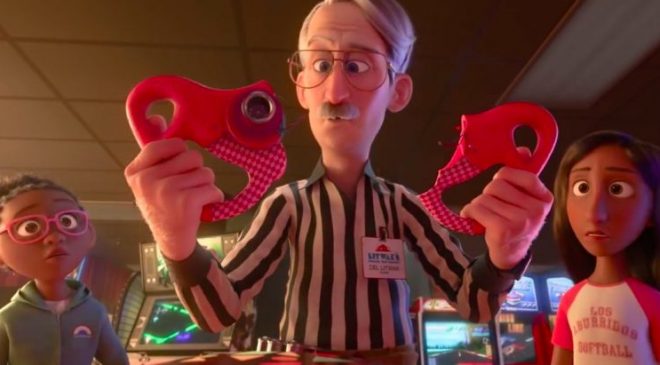
In the sequel, Ralph (John C Reilly) and Princess Vanellope (Sarah Silverman) journey into the Internet when an exuberant arcade customer breaks the steering wheel off of the Sugar Rush game, ensuring it will be shut down and junked. There they attempt to buy a replacement wheel for the old game on Ebay, but lack the funds to do so. Welp, cue the requisite money-making schemes online, particularly Spamley (Bill Hader) as a pop-up clickbait entity who trades on less-than-honourable methods of obtaining wealth (including, at one point, voyaging into the Dark Web – will kids appreciate the humour in that?), and fashionable Buzzztube algorithm Yesss (Taraji P Henson), who gathers online attention through viral videos. When Vanellope enters a more modern racing game known as Slaughter Race, and meets the hip and beautiful Shank (Gal Gadot), she comes to realise she needs more from life than just racing the same three tracks on her old game, and wants to bail on Ralph and their friendship. The lengths Ralph will go to to prevent this, however, may just bring down the entire Internet.
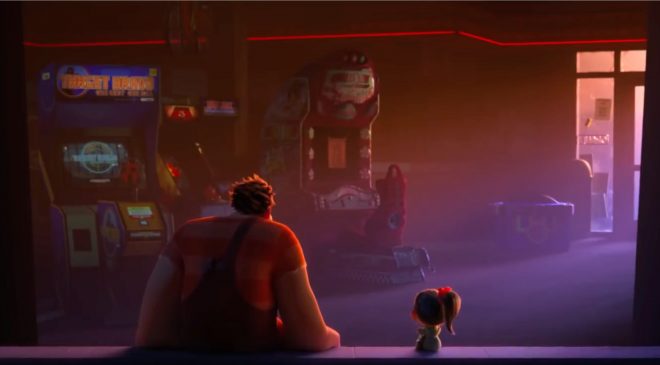
What astonishes me about the Ralph films is just how self-aware of their branding they are. The first film traded on 80’s arcade game nostalgia and the rise of modern digital gaming by stark contrast. Now, Ralph and Vanellope take their established friendship and voyage into the relatively infinite abyss of the Internet, portrayed in this film as a monolithic metropolis of lights and sound, a little like Tokyo city multiplied by a bazillion. Some of the humour in Ralph Breaks The Internet feels a touch recycled from The Emoji Movie, but the flavouring here is a lot more intricate and the delivery an order of magnitude better; iconic brands such as YouTube, Twitter and Facebook, as well as Amazon, Ebay, Fandango and a slathering of others all make their presence known, whilst Disney Studio properties – including Lucasfilm’s Star Wars, sister company Pixar and comic-book behemoth Marvel – are all given a significant amount of screen time. Not to mention the inclusion of every Disney Princess (voiced almost entirely with their original vocal talents) in a hilariously on-point sequence skewering of the studio’s own commercial persona: this film breaks a lot of Disney taboos, albeit appearing to adhere strictly to a lot of others. In other words, Ralph Breaks The Internet is a film completely enveloped in the Disney mould, much as it might suggest otherwise.
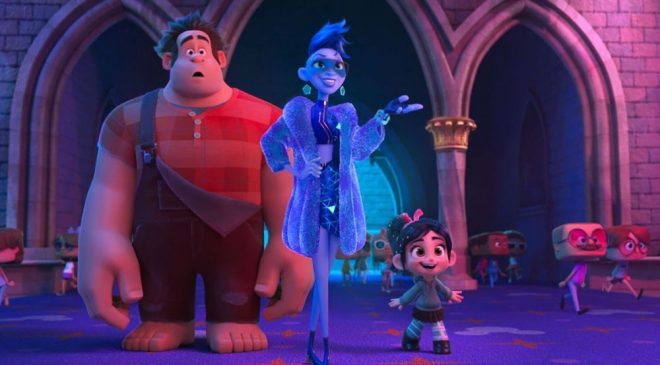
Being a sequel, we’re expected to know the majority of the core characters: Ralph and Vanellope aside, other faces from the first film make appearances (and voice cameos), including Fix-it Felix (Jack McBrayer), his now-wife Calhoun (Jane Lynch), the denizens of the game “Wreck It Ralph” and others in Litwak’s Arcade, and even Alan Tudyk, who voiced King Candy in the original movie, has a part to play again as an aggressively autofilled search engine. The setup assumes we’ve all seen the earlier film (although a very brief recap is given) and leaps right into the heart of the story’s set-up; Vanellope is bored and wants something different in her game, which asks Ralph to “help” and inadvertently cause Sugar Rush to break, resulting in their Internet adventure. The writing on Ralph Breaks The Internet is exceptionally good, care going into every line and subplot, every nuance and character moving forward throughout the film irrespective of their screen-time. Gal Gadot’s sexy femme fatale racer character is one of the better elements of the film’s supporting roster, as is the vampish Taraji P Henson’s Yesss, who reminds me of a possible character in Inside Out. And of course, both Silverman and Reilly know their lead roles inside out (ha) enough that they slip back into these parts with ease. Silverman’s Vanellope has less to do in this film than she did previously, but Reilley’s growth in Ralph himself forms the crux of much of the movie’s enjoyment. That, plus his constant failure to understand The Internet makes us laugh a lot.
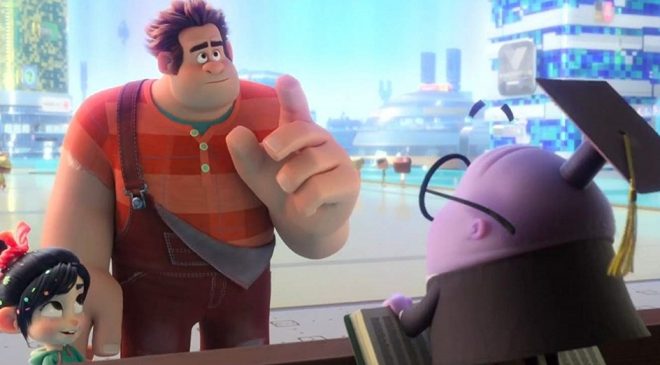
Which goes to my point: will Ralph Breaks The Internet age well, or will it become a film filled with current meta-humour and pop-culture jokes that won’t mean a thing in about ten years time? At least not to kids watching by then, anyway?
Sadly, I think not. A lot of the humour is timeless, and Ralph Breaks The Internet does a lot right in making itself feel like a timeless story, despite the setting. But the stream of gags about modern Internet meme culture and technological placement will probably age-out over the next decade, and I think this will make the film far less appreciated as my kids grow up and have kids of their own. Who knows, will Facebook or Twitter still be around in a decade, or will they have been supplanted by a better, even more commercially retrograde platform? Which goes to my point, in that a lot of this film’s sight gags and frills around the edges won’t mean a lot to kids in twenty years, much like computer technology of older 90’s films (have you seen that Sandra Bullock film The Net recently? Egads!) hasn’t, which annoys me because Ralph Breaks The Internet has the potential to be an all-timer, especially in conjunction with its predecessor. It’s a film I’ll be happy to re-watch a lot, it’s that good (and I don’t say that lightly, there are very few films I get time to revisit these days) so if you’re at all entertained by being entertained then this movie will absolutely satisfy your urges.
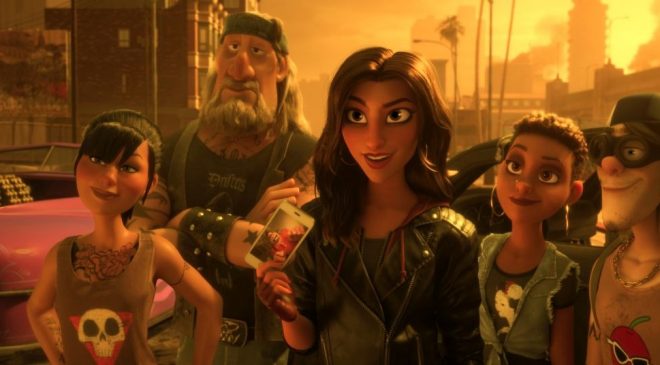
Ralph Breaks The Internet is visually dynamic, insanely clever and paaaaacked full of puns, gags, cameos and bit-parts that will delight internet savvy audiences across the globe. It will tickle many a funny bone and may even produce a tear or two by the time we get to the Imagine Dragons credit track, while kids will absolutely lap up the “zany” antics of Ralph and other Internet inhabitants with glee. But I watched this with a tinge of regret – nay, sorrow, I think – in that by the time I have grandchildren of my own a lot of what we see on the screen won’t land with the same impact, or be extinct altogether.


Er… okay. You won’t get much argument from me!